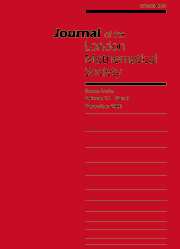Crossref Citations
This article has been cited by the following publications. This list is generated based on data provided by
Crossref.
Caballero, M. E.
and
Chaumont, L.
2006.
Conditioned stable Lévy processes and the Lamperti representation.
Journal of Applied Probability,
Vol. 43,
Issue. 4,
p.
967.
Caballero, M. E.
and
Chaumont, L.
2006.
Conditioned stable Lévy processes and the Lamperti representation.
Journal of Applied Probability,
Vol. 43,
Issue. 04,
p.
967.
Caravenna, Francesco
Giacomin, Giambattista
and
Zambotti, Lorenzo
2006.
Sharp asymptotic behavior for wetting models in (1+1)-dimension.
Electronic Journal of Probability,
Vol. 11,
Issue. none,
Caravenna, Francesco
and
Chaumont, Loïc
2008.
Invariance principles for random walks conditioned to stay positive.
Annales de l'Institut Henri Poincaré, Probabilités et Statistiques,
Vol. 44,
Issue. 1,
Ben-Ari, Iddo
Merle, Mathieu
and
Roitershtein, Alexander
2009.
A random walk on Z with drift driven by its occupation time at zero.
Stochastic Processes and their Applications,
Vol. 119,
Issue. 8,
p.
2682.
Vatutin, Vladimir A.
and
Wachtel, Vitali
2009.
Local probabilities for random walks conditioned to stay positive.
Probability Theory and Related Fields,
Vol. 143,
Issue. 1-2,
p.
177.
Denisov, Denis
and
Wachtel, Vitali
2010.
Conditional Limit Theorems for Ordered Random Walks.
Electronic Journal of Probability,
Vol. 15,
Issue. none,
UCHIYAMA, Kôhei
2011.
One dimensional lattice random walks with absorption at a point/on a half line.
Journal of the Mathematical Society of Japan,
Vol. 63,
Issue. 2,
Caravenna, Francesco
and
Chaumont, Loïc
2013.
An invariance principle for random walk bridges conditioned to stay positive.
Electronic Journal of Probability,
Vol. 18,
Issue. none,
Kyprianou, Andreas E.
2014.
Fluctuations of Lévy Processes with Applications.
p.
335.
Denisov, Denis
and
Wachtel, Vitali
2015.
Random walks in cones.
The Annals of Probability,
Vol. 43,
Issue. 3,
Uchiyama, Kôhei
2017.
One dimensional random walks killed on a finite set.
Stochastic Processes and their Applications,
Vol. 127,
Issue. 9,
p.
2864.
Duraj, Jetlir
and
Wachtel, Vitali
2020.
Invariance principles for random walks in cones.
Stochastic Processes and their Applications,
Vol. 130,
Issue. 7,
p.
3920.
Chaumont, Loïc
and
Kyprianou, Andreas E.
2021.
A Lifetime of Excursions Through Random Walks and Lévy Processes.
Vol. 78,
Issue. ,
p.
1.
Parekh, Shalin
2022.
Positive random walks and an identity for half-space SPDEs.
Electronic Journal of Probability,
Vol. 27,
Issue. none,
Vatutin, Vladimir Alekseevich
Dong, Congzao
and
Dyakonova, Elena Evgen'evna
2023.
Random walks conditioned to stay nonnegative and branching processes in an unfavourable environment.
Sbornik: Mathematics,
Vol. 214,
Issue. 11,
p.
1501.
Vatutin, Vladimir Alekseevich
Dong, Congzao
and
Dyakonova, Elena Evgen'evna
2023.
Случайные блуждания, остающиеся неотрицательными, и ветвящиеся процессы в неблагоприятной среде.
Математический сборник,
Vol. 214,
Issue. 11,
p.
3.
Fotopoulos, Stergios B.
2024.
The distribution of the maximum likelihood estimates of the change point and their relation to random walks.
Statistical Inference for Stochastic Processes,
Vol. 27,
Issue. 2,
p.
335.
Hong, Wenming
and
Sun, Mingyang
2024.
Scaling limit of the local time of random walks conditioned to stay positive.
Journal of Applied Probability,
Vol. 61,
Issue. 3,
p.
1060.
Hong, Wenming
and
Sun, Mingyang
2024.
Berry-Esseen theorem for random walks conditioned to stay positive.
Electronic Communications in Probability,
Vol. 29,
Issue. none,

